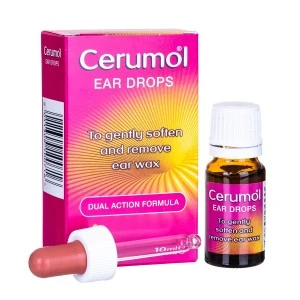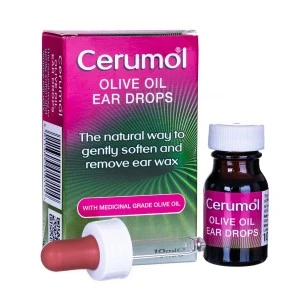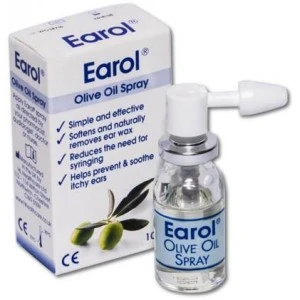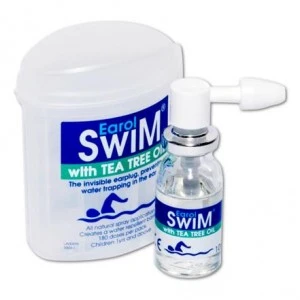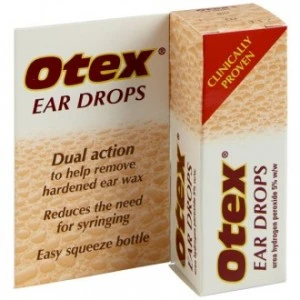Ear care
We often overlook our ear health, but our ears are crucial, not only for hearing, but also for maintaining our balance.
Prescription Doctor offers a number of treatments to keep your ears in tip-top condition.
Cerumol Ear Drops
- Loosens impacted earwax
- Contains an antibacterial
- Available from a UK pharmacy
Cerumol Olive Oil Ear Drops
- 100% Natural treatment
- Easy to use
- Available without prescription
Earol Olive Oil Spray
- Softens impacted ear wax
- Natural ingredients
- Easy to administer
Earol Swim
- Creates a natural water-resistant barrier
- Used before swimming to protect the ears
- Comes with a protective carrying case
Otex Express Ear Drops
- Breaks up hardened earwax
- Available without prescription
- Eligible for next-day delivery
Why is it important to look after our ears?
Our ears enable us to perceive the world around us aurally, and the vestibular system within our inner ears helps maintain our balance and coordination.
Despite the importance of our ears, we often neglect their care until a problem arises.
One common affliction of the ears is earwax impaction. This occurs when earwax becomes lodged within the auditory canal of the outer ear, resulting in a blockage.
Symptoms of earwax impaction can include:
- Difficulty hearing
- Dizziness
- Ear infection
- Earache
- Itching in the ear
- Ringing in the ears (Tinnitus)
Symptoms may not always be present in cases of earwax impaction. Some people may only experience sudden hearing loss in one ear or a feeling of fullness in the ear.
However, dizziness and nausea may be reported, as the build-up of earwax can affect the vestibular system, located in the inner ear, which is responsible for balance and spatial orientation.
If you suspect you have impacted earwax, speak to your doctor.
What is the purpose of earwax?
Earwax, known medically as cerumen, is an oily, waxy substance secreted by ceruminous glands in the ear.
The substance plays several roles in the ears, similar to mucus within the nasal passages.
Not only does earwax keep the ear canal lubricated and waterproof, but it also helps to prevent foreign particles from reaching the eardrum, which might lead to an infection.
The earwax traps particles such as dust, fungi spores and dead skin cells, which are removed when the wax falls out of the ear during sleep.
The antibacterial and antifungal properties of earwax have also been noted, further solidifying its role in preventing ear infections.
What causes earwax impaction?
An excessive build-up of earwax causes earwax impaction.
Most cases of this condition are caused by attempts to remove excessive earwax from the ear canal.
Using cotton buds in your ears will do very little to alleviate your condition and can even make things worse. Cotton buds push the earwax deeper into your ear and closer towards your eardrum. Moreover, pushing the cotton bud too far can rupture the delicate membrane of the eardrum.
In the ageing population, earwax impaction is common. As we age, our earwax becomes drier and harder, making it more difficult for the body to remove.
Using hearing aids, earplugs, and earphones (especially the in-ear variety) increases your risk of earwax impaction, as these devices can push earwax deeper into the ear.
How can I treat earwax impaction?
If you have concerns about the build-up of earwax, speak to your GP.
Do not attempt to remove impacted earwax using cotton buds, fingernails, toothpicks or any other long, thin foreign body. These can scratch the delicate skin of your ear canal, increasing your risk of an ear infection.
Inserting things into your ear to fish out the lodged earwax is likely to only make the matter worse, either by further compacting the earwax or accidentally puncturing your eardrum, also known as a perforated eardrum.
Some GP surgeries can remove earwax using one of two treatments:
Ear Irrigation:
Earwax is flushed out with warm water.
Microsuction:
A small nozzle is inserted into the ear to remove the earwax using suction.
These treatments are usually painless and are often effective, relieving the symptoms as soon as the earwax is removed.
Ear drops may need to be used for up to 5 days after irrigating your ear(s).
Ear drops
If your GP practice cannot offer these treatments, an over-the-counter treatment, such as ear drops, can be used instead.
Depending on the ingredients, ear drops can either loosen stubborn earwax or break the earwax down. Ear drops are inexpensive and can be purchased without a prescription from your local pharmacist.
You can also buy ear drops online from Prescription Doctor. Order before 3pm on weekdays, and we'll dispatch your item the same day, aiming for next-day delivery.
We offer a range of products from brands including Cerumol, Earol and Otex, including Otex Combi, which comes with a bulb syringe for irrigating your ears at home, and Earol Swim.
Frequently asked questions
Can candling treat earwax impaction?
One popular treatment for removing earwax is known as "Ear Candling". This is a procedure in which a tapered candle is inserted into the ear and lit. It is often touted as a natural remedy for earwax, and many proponents of this method claim it is effective at removing earwax and "toxins" from the ear.
Not only is candling ineffective at removing earwax, but it is also a very dangerous procedure. It can lead to skin and hair burning, unnecessary pain, and, worse still, contribute to the condition by introducing more wax into the ear and increasing the risk of developing an ear infection.
My ears produce excessive earwax - what should I do?
Some people's ears naturally produce more earwax than others, which increases the risk of earwax impaction and can affect their hearing.
If you experience excessive earwax regularly, consult your doctor or a pharmacist for suitable advice.
Your doctor may suggest using ear drops regularly to maintain the amount of earwax in your ears.
Why is my earwax dark?
Earwax darkens the longer it stays in your ear. It darkens due to the dirt and dust it collects, preventing it from reaching your eardrum.
Fresh earwax is usually yellow or light orange.
Black earwax is often impacted earwax.
How can I clean out earwax?
Generally, there is no need to clear out earwax unless it's causing you a significant problem.
The wax is there to protect your inner ear from infection. Dirt, pollen and other particulates get trapped in the wax, which falls out during sleep.
If you notice earwax on the outside of your ear, you can use a cloth soaked in warm water to wipe it away. The warm water will help to melt the earwax, making it easier to clean.
Generally, you shouldn't need to clean the earwax out of your ear on a continuous basis. If you find that your ears produce an excessive amount of earwax or you are experiencing the symptoms of earwax impaction, you should seek advice from your doctor.
Can earwax impaction cause deafness?
Impacted earwax can cause temporary hearing loss. However, hearing usually returns to normal once the impaction has been cleared.
If the impaction is not cleared, worsens, or if you use cotton buds to remove the wax, there is an increased risk of permanent hearing loss.
How can I prevent earwax impaction?
There are several steps you can take to prevent impacted earwax.
Firstly, avoid sticking anything into your ear canal, including cotton buds.
If you wear in-ear earphones, consider switching to over-ear headphones that don't go into your ear.
Use ear drops regularly to prevent excess earwax from building up. This is especially important if you use a hearing aid.
© 2013 - 2026 Al Muhsineen Limited. All Rights Reserved. Registered Pharmacy: 34 Halliwell Road, Bolton BL1 8RL. Registered Office: 254 First Floor, Shearbrow, Blackburn, England, BB1 8DS

